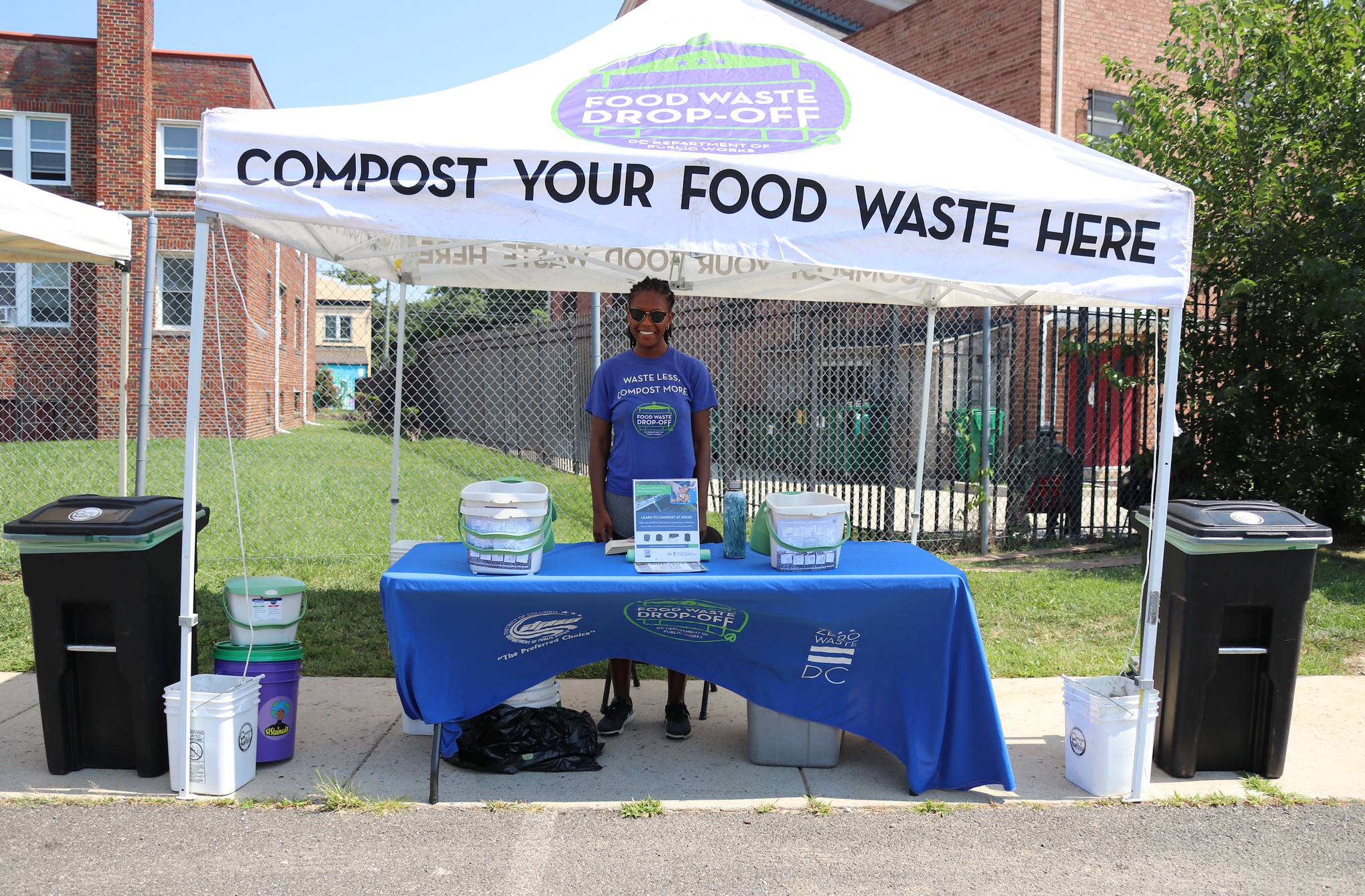Imagine the weight of 33 Capitol domes—about 150,000 tons. That’s roughly how much food waste the Department of Public Works (DPW) collects from the 105,000 homes it services each year (never mind the businesses, multifamily residences, and apartments serviced by other providers). In other words, our banana peels and coffee grounds add up.
A new DPW composting program aims to save some of that waste and transform it into compost, a nutrient-rich, soil-like material that can be used as fertilizer. Set to launch this summer, the program will provide free curbside collection of food waste for up to 12,000 residents during its first pilot year.
It’s part of the District’s 2013 goal of diverting 80 percent of its waste away from landfills by 2032 (ten years on, we’re currently at about 16 percent). When the city launched a food waste drop off program in 2017, it quickly proved popular, and there were a total of roughly 132,000 drop offs in 2022, according to Rachel Manning, a Zero Waste Program Analyst with DPW. Still, it can be a chore for people to lug bags of food waste to one of the ten drop-off sites—hence, curbside collection.
“People love [the drop off program] and so we want to offer more options to make food waste diversion easier and more convenient for residents,” says Manning, who explains that the pilot will test how feasible a city-wide curbside composting program is. Currently, Prince George’s County, Arlington County, and Montgomery County all have similar programs.
Applications for the program open on April 22 at 9 AM. Here’s what you need to know and how you can sign up:
Who is eligible?
Single family households that already receive trash and recycling services from DPW are eligible for the pilot program. Up to 1,500 households in each ward can participate. Commercial properties and households in multi-family buildings with four or more units are not eligible.
How can I sign up?
Applications, which will be accepted on a first-come, first-served basis, open tomorrow morning at 9 AM on the DPW website.
What does it involve?
If accepted, you’ll receive a countertop compost caddy (which doesn’t have to go on your kitchen counter but could be put wherever is most convenient), education materials, a set of compostable liner bags, and a curbside collection bin that will be placed alongside your DPW trash and recycling bins.
You’ll line your countertop caddy with one of compostable bags and fill it with food waste. Once it’s full, you’ll tie off the bag and carry it to the container outside. A third-party contractor—which hasn’t been chosen yet—will then pick up the food waste on a weekly basis and take it to a nearby facility where it’ll be turned into compost.
Won’t this just be a free buffet for rats and other critters?
The compost bins come with a screw-top lid that, if used correctly, is effective at keeping odors in and rats out, says Manning. “Rodents are attracted to the smell of food and how easy it is to get to, and currently when households are placing their trash, which contains food, into our containers, they don’t close them securely. In this case, when participants are separating that food waste out and setting them in a separate containers with a secure lead that is odor free, they can actually prevent rodents.”
Why compost? Won’t food just decompose in the landfill anyway?
Not quite. The lack of oxygen in landfills causes organic materials to undergo anaerobic decomposition which produces methane—a type of greenhouse gas that’s significantly more potent than carbon dioxide. “By separating out that food waste from our trash and sending it to be processed for composting, folks can reduce these emissions and instead allow for the creation of a nutrient rich soil amendment that can be used for gardens and local parks. That finished compost can help soil retain moisture and nutrients, which is better for growing plants, fruits, and vegetables,” explains Manning.
What can I compost?
You’ll be able to compost most organic materials, such as fruit, vegetables, crushed egg shells, coffee grounds, tea bags, nut shells, breads, grains, cereals, rice, pasta, and household flowers. The curbside program will also accept meat, dairy, and bones, a notable difference from the current drop-off program’s restrictions.
When does it start?
No official start date has been set, as the city is still finalizing which third-party contractor to use, but Manning says you can expect it to begin by summer. Once underway, the city estimates the pilot program will remove 6,000 tons of food waste from landfills.
I don’t qualify for the program. Is there another way I can compost?
In addition to the drop-off program, DPW also has home composting workshops. Residents who complete the workshops can qualify for a $75 rebate if they purchase an at-home compost bin.














